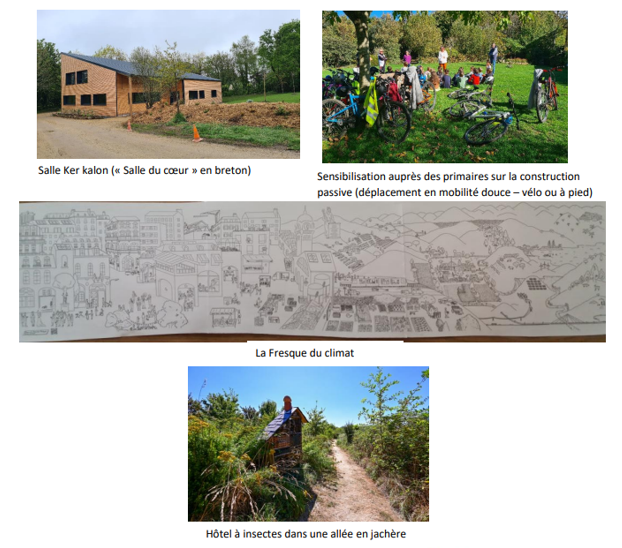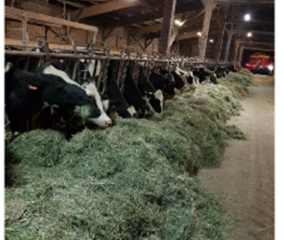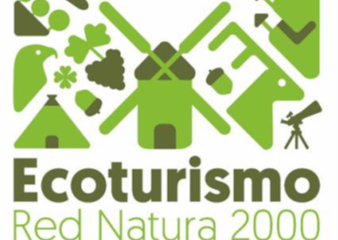Creation of a wellbeing activity room and a forum for sustainable development in Plougoumelen (56 – France)
France
Introduction
The project consisted of funding 3 actions
1) The creation of a 100m2 collective passive room using bio-sourced materials
2) The creation of “La Fresque du climat” (a tool based on data from the IPCC’s scientific reports, whose recommendations guide political and economic decisions on a global scale)
3) The organisation of free events focusing on ecological transition, thinking about changing lifestyles and raising awareness of eco-responsible actions. These activities were and are aimed at schools and the general public (French and/or foreign visitors who come to stay at the campsite and/or take part in events hosted in the passive room).
In conclusion, the aim of this project was to raise awareness of new eco-responsible actions and to discuss the obstacles encountered, the improvements made and the positive impacts.
Presentation of the project
Location The Fontaine du Hallate campsite is located in the commune of Plougoumelen, in Morbihan, on a 3-hectare site open to the public. It’s a place where anyone can come and stroll freely to buy products from local producers or to discover biodiversity with its butterfly trees, bats, beehives and numerous species, or to understand the workings of a vegetable garden that respects the principles of agro-ecology and permaculture. Background The school bases its activities on ecological and environmental conservation values (rainwater recovery for sanitary facilities, preservation of biodiversity, collective composting, supply of vegetables to the catering area mainly produced on site thanks to the kitchen garden, etc.). As a result of its commitment to the environment, the campsite has joined nature conservation networks and is now recognised as a guarantor of respect for the environment. As a result of this commitment, it was the 1st campsite in the world to be awarded “Green Globe” certification in 2012. This international certification is awarded on the basis of 44 groups of criteria and 380 sustainable development indicators – to co-found “Green Morbihan” in 2018 – to obtain labels such as “Ecolabel Européen” (since 2010), the “biorismo” label (promoting biodiversity) and “La clef verte” (since 2009) – to be classified as a “bat sanctuary”, “butterfly garden” and “Jardin de Noé” (garden dedicated to biodiversity). In view of the above, the establishment takes part in national meetings on eco-responsible practices to raise awareness among citizens and holidaymakers of the acceleration of ecological transitions, the importance of the circular economy and the need to reduce our carbon footprint. Due to a lack of covered space, these meetings cannot take place on this site, whose commitment is recognised by environmental protection networks. Locals and Bretons generally have to travel to the capital or the south of France. Objectives The project involved co-financing a 100m2 collective passive space within a new 310m2 passive building. Aimed at schoolchildren and the general public, the aim was to organise events related to passive construction, meetings, workshops on eco-responsible actions and on-site visits to good practice. La Fresque du climat”, a neutral tool based on data from the IPCC’s scientific reports, whose recommendations guide political and economic decisions on a global scale, was also co-funded. The objectives of such a project are currently : – Organise actions to promote sustainable development – Continue to run well-being activities (yoga, reflexology, shiatsu, etc. To continue to run wellbeing activities (yoga, reflexology, shiatsu, etc.) and events linked to ecological transitions during periods of bad weather – To run actions on transitions in a venue that is consistent with transitions (positive energy venue) Actual or expected achievements – Events linked to the acceleration of ecological transitions – To become a benchmark venue in environmental matters that welcomes all types of public (local, Develop partnerships with networks in the fields of ecology, medico-social and education, among others LEADER’s role in the project (funding, support, networking, etc.). The LEADER team supported the project leader in: – avoiding expenditure perceived as commercial (wellness activities, room hire and resale of the electricity produced by the solar panels) – structuring a schedule of free events geared towards ecological transition – highlighting the local interest of such a reference point for ecological transition – seeking joint eligible expenditure with a public co-funder – drawing up 2 budgets: an initial budget based on actual project expenditure (€469,888.42) and another stipulating LEADER-eligible expenditure (€91,481).
The emblematic character of the project
Innovative nature of the project Linking theory to practice by demonstrating eco-responsible actions on site. Because of the project owner’s ecological commitment to its 3 hectares of land and its economic activity, the holding of events linked to the preservation of nature has a positive impact by demonstrating good practices at the end of the meetings. These actions are given greater resonance by being hosted in a passive space that respects resources and their reuse. Why is this project a LEADER priority in your strategy? The operation supported – promoting social links in a healthy environment (natural spaces open to all; hosting local events, local producers’ market, organic vegetable garden supplied by all, etc.) – forges partnerships between public players, associations and businesses. The project leader has shown that the boundaries between the public and private spheres are porous when it comes to working to preserve our planet. Partnerships have been created with both public players – such as local authorities, educational areas and the Regional Nature Park – and private players such as companies and associations. The latter focus on ecology, the circular economy, waste management, the social economy and/or the medico-social sector. – Bringing together local, French and European players to think collectively about what needs to be done in terms of sustainable development, and not just in relation to sustainable tourism – Mobilising local people in support of eco-citizen projects in rural areas. Without any major change, human activities are accelerating climate change and undermining certain local balances. It is important to raise awareness so that production and consumption patterns converge towards cycles and lifestyles with a smaller ecological and climate footprint. – Responding to European and national directives on ecological and energy transition (European Union Green Pact, December 2019; Climate and Resilience Act, June 2021; “France 2030” investment plan, October 2021). The building sector is notoriously energy-intensive. To reduce greenhouse gas emissions by 40% by 2030 and achieve carbon neutrality by 2050, the use of bio-sourced materials and old, revisited or recycled materials must be stepped up, especially as the region has resources and know-how that deserve to be developed. These are just some of the reasons why the LEADER programme was supported. How could the project be transferred to other LAGs? By setting up cooperation between LAGs or holding meetings at the Fontaine du Hallate campsite..
Pictures

Camping de la Fontaine du Hallate
L’Entente du Pays de Vannes
Bretagne

